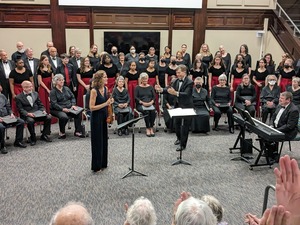The Brussels Chamber Orchestra breezed into Raleigh on July 2, bringing a large quantity of those fabulously sinful chocolates for which their home country is so famous. The candy disappeared quickly, before and after the ensemble’s opening concert, but the artists stuck around, playing in Cary and Durham and even taking in a ball game before the BCO’s final program in the capital. The occasion was the Cross Currents Chamber Music Arts Festival, a joint undertaking of the BCO and a locally-based Friends group, one primary goal of which is to create an annual series of programs that will feature the orchestra as the core ensemble, augmented by some international soloists and the best of our local players. This year, the latter came from the NC Symphony and the Mallarmé Chamber Players – and it should be no surprise that all but one of ’em represented both groups.
In Durham, the Kirby Horton Hall, at the edge of Duke Gardens, was packed with more folks than are normally shoe-horned in, thanks to closely-placed chairs facing the back of the room instead of looking out toward the gardens. This meant that the musicians played under a fairly low ceiling with reasonably close-in side walls, so the net effect was that of a shell of sorts. This gave admirable focus to the sound, and the sound itself was exceptional, for the BCO’s members and the evening’s guests – violinist Jacqueline Saed Wolborsky, cellist Bonnie Thron, and violist Suzanne Rousso (who is the MCP’s artistic director) – are about as good as they come.
The concert began with a welcome from Ken Rumble of Duke Performances, which presents the Wednesday evening summer series at the Gothic Rockpile. There followed remarks by one of the finest younger musicians to emerge from Durham, composer and cellist Thomas Kraines (b.1970), who is currently teaching at Temple and Princeton and whose 2000 Three Pieces for Violin and Cello, written for performance by his wife (currently a member of the Philadelphia Orchestra) and himself, was offered by Wolborsky and Thron. It was wonderful to have a modern score by a living composer enjoy pride of first place in this program, and it was good, too to have the benefit of Kraines’ written and spoken comments. The performance of the three distinct pieces – always engaging, sometimes moving, at other times amusing – was astonishingly fine. These musicians are busy folks, and they must have put this together in fairly short order, but the realization radiated confidence and mastery, too, and the place erupted with applause at its conclusion.
Next was a reading of Beethoven’s very rarely heard First String Trio (Op. 9/1), a work that is, in its way, every bit as impressive as Kraines’ early composition. This received a performance of exceptional polish and probity by violinist Nana Kawamura, violist Maxime Desert, and cellist Mario Villuendas, all of the BCO. These are artists who think and play as one, and the result was a reading that wowed the crowd, again eliciting heartfelt and enthusiastic responses.
After the intermission, Dvorák’s Serenade No. 1, in E, Op. 22, featured the full ensemble with augmentees Wolborsky, Rousso, and Thron – 15 strong, with the first violins on the left, the seconds on the right, the cellos where the seconds often are in domestic orchestras, the violas tucked in behind the seconds, and the lone bassist in the center, at the back. (This work also figured in the BCO concert of July 5, for a review of which, click here.) The venue flattered the “seating” arrangement (actually, all but the cellists stood), so the clarity, definition, and directionality of the sound was often electrifying – and never mind the brilliant playing from this virtuoso band! There was another uproar from the crowd, resulting in a true encore – the second part of the Scherzo movement of the just-played Dvorák.
These folks set very high standards during this, their second visit. Here’s hoping the Friends group succeeds in raising the cash it will take to bring them back next summer.
That opening concert, on July 2, was a gala at moderately high ticket prices that featured a single work, Vivaldi’s The Four Seasons. The soloist was Nana Kawamura, and the accompanying ensemble included nearly all of the BCO regulars. The venue was Burning Coal’s small theatre in Murphey School, in Raleigh, which seats about 160 people. It proved to be a good room for music, but the air conditioning is apparently either noisy or unbaffled, so it was turned off during the performance, making for an increasingly uncomfortable listening experience for some in the audience and – presumably – for some of the players, too.
It’s easy to forget that The Four Seasons hasn’t always been ubiquitous. The earliest recording of the four short concerti didn’t emerge till after WWII – one of the first featured Louis Kaufman, and one of the first “big orchestra” versions featured violinist John Corigliano (the composer’s father) with the New York Philharmonic conducted by Guido Cantelli. These early takes seem anachronistic now, since we are so used to smaller ensembles in baroque music. The BCO plays modern instruments, but they have this music thoroughly under their fingers, and hearing them play the four works was in many respects revelatory, in terms of the precision and clarity and immaculate ensemble they projected. The only thing they might have done to improve on the evening would have been to engage a poet – our new poet laureate would have been a good pick – to read the poems that go with each concerto.













